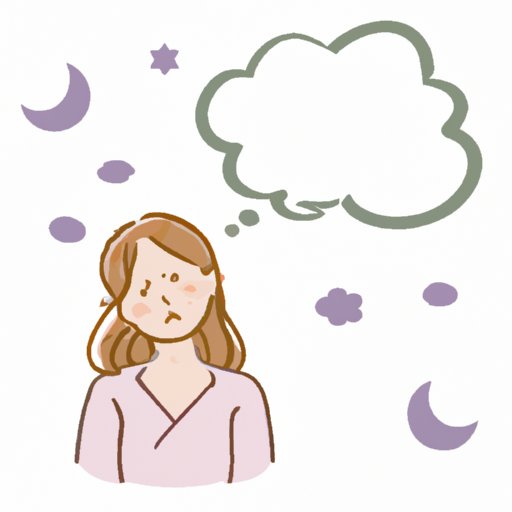Introduction
Sleep is an essential part of life that affects our physical, mental, and emotional health. Despite its importance, many people struggle to get enough sleep or experience poor quality sleep. Lack of sleep can lead to mood swings, fatigue, poor memory, and concentration, among other things. The purpose of this article is to help you improve your sleep habits, so you can enjoy better quality sleep and wake up feeling refreshed.
5 Simple Tips for a Better Night’s Sleep
Here are our top 5 tips for a better sleep, which you can start implementing immediately.
Tip 1: Establish a Consistent Sleep Schedule
Try to maintain a consistent sleep schedule, even on weekends. This helps regulate your body’s sleep-wake cycle, making it easier to fall asleep and wake up naturally.
Tip 2: Create a Relaxing Sleep Environment
Your bedroom environment should be conducive to sleep. Keep the room cool, dark and quiet, and invest in a comfortable mattress and pillows.
Tip 3: Practice a Relaxing Bedtime Routine
Starting a relaxing bedtime routine signals to your body that it’s time to sleep. Take a warm bath, read a book or listen to calming music to help you relax.
Tip 4: Avoid Stimulants and Heavy Meals Before Bed
Stimulants like caffeine and nicotine, as well as heavy meals, can interfere with your sleep. Try to avoid them in the evening, or at least several hours before bedtime.
Tip 5: Limit Screen Time Before Bed
The blue light emitted by electronic devices can disrupt your body’s natural sleep-wake cycle. Avoid using electronic devices like phones, tablets, or computers before bed.
The Ultimate Guide to Improving Your Sleep Habits
Beyond the basic tips, there are several other strategies you can use to improve your sleep habits. Here are some of our best pieces of advice.
Exercising Regularly
Regular exercise can help improve your sleep quality, but avoid exercising too close to bedtime as it can stimulate your mind and make it harder to fall asleep.
Reduce Stress and Anxiety
Stress and anxiety can keep you tossing and turning all night. Practice stress-reducing techniques like journaling, meditation, or deep breathing before bed.
Avoid Napping During the Day
Napping can throw off your sleep schedule, making it harder to fall asleep at night. If you must nap, keep it short (15-20 minutes) and avoid napping after 3 pm.
Evaluate Your Sleep Environment
Ensure your bedroom is dark, quiet, and cool. Use blackout curtains, earplugs or a fan to create a sleep-inducing environment.
Address Snoring or Sleep Apnea
Snoring or sleep apnea can disrupt your sleep and lead to health problems. Seek medical advice if you or your partner notice any symptoms.
Maximizing Your Sleep: Expert Advice for Better Rest
The amount of sleep needed varies from person to person; quality sleep is just as important as the length of your sleep. Here is expert advice on how to achieve better sleep quality:
Sleep Quality vs Quantity
Quality sleep is vital for good health and wellbeing. Aim for 7-8 hours of sleep each night, but rather than focus on the amount of time spent asleep, concentrate on improving the quality of your rest.
The Stages of Sleep and Their Importance
Sleep follows a pattern of stages, each playing a vital role in refreshing both the mind and the body. Developing an understanding of the sleep cycle can help you improve both sleep quality and quantity.
Provide Expert Advice on How to Achieve Better Sleep Quality
Expert advice to improve sleep quality includes using the right mattress, sleeping in the right position, developing sleep rituals and routines, and avoiding disturbances such as background sounds, light, and temperature.
The Sleep Remedy: Top Solutions for Insomnia and Poor Sleep Quality
If you experience ongoing or severe sleep problems, it’s important to seek medical advice. Here is a list of common sleep disorders and remedies for each:
CBT for Insomnia
Cognitive-behavioral therapy (CBT) is a type of talk therapy that can help people change behaviors and thoughts that disrupt their sleep cycle.
Medication for Sleep Apnea
In some cases, medication can help relieve symptoms of sleep apnea and improve sleep quality.
Sleep Smarter: How to Wake Up Feeling Refreshed and Energized
Waking up feeling refreshed and energized can make all the difference in your day. Here are some tips for a refreshing morning routine and maintaining energy throughout the day:
Importance of Waking up Feeling Refreshed
Waking up feeling refreshed has numerous benefits, including better mood, improved cognitive function, and increased productivity.
Tips for a Refreshing Morning Routine
Start your day on the right foot with a morning routine featuring exercise, a healthy breakfast, and plenty of natural light.
Tips for Maintaining Energy Throughout the Day
A balanced diet, regular exercise throughout the day, frequent breaks from technology, and getting outside for some fresh air are a few ways to keep your energy levels up throughout the day.
Conclusion
Good sleep is essential for a healthy and productive life. By implementing some of the tips and advice in this article, you can improve your sleep quality and enjoy better overall health. However, if you are still experiencing sleep problems, talk to your doctor or consult a sleep specialist for professional help.
